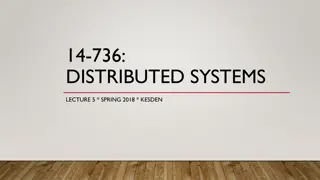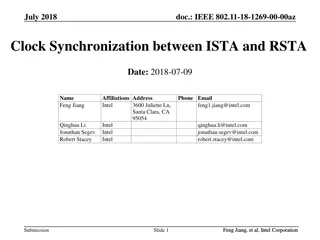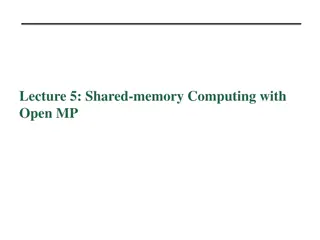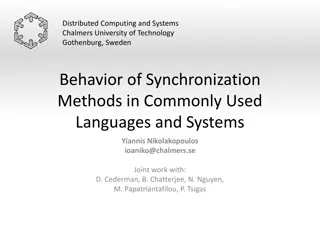Understanding C++ Parallelization and Synchronization Techniques
Explore the challenges of race conditions in parallel programming, learn how to handle shared states in separate threads, and discover advanced synchronization methods in C++. Delve into features from C++11 to C++20, including atomic operations, synchronization primitives, and coordination types. Understand the intricacies of low-level threads and the functionalities provided by the thread class. Uncover the nuances of jthread, its autostopping capabilities, and handling stop tokens.
Download Presentation

Please find below an Image/Link to download the presentation.
The content on the website is provided AS IS for your information and personal use only. It may not be sold, licensed, or shared on other websites without obtaining consent from the author. Download presentation by click this link. If you encounter any issues during the download, it is possible that the publisher has removed the file from their server.
E N D
Presentation Transcript
C++ - parallelization and synchronization Jakub Yaghob
The problem Race conditions Separate threads with shared state Result of computation depends on OS scheduling
Race conditions simple demo Initial state Linked list Shared state List lst; Thread A lst.push_front(A); Thread B lst.push_front(B); lst X Y Correct state lst B A X Y Another correct state lst A B X Y Incorrect state A lst X Y B
Race conditions advanced demo Shared state Counter c; Thread A c.increment(); cout << c.get(); Thread B c.increment(); cout << c.get(); Possible outputs 12, 21, 11 struct Counter { Counter():value(0) { } int value; void increment() { ++value; } void decrement() { --value; } int get() { return value; } };
C++ features C++ 11 Atomic operations Low-level threads High-level futures Synchronization primitives Thread-local storage C++14 features Shared timed mutex C++17 features Parallel algorithms Shared mutex C++20 features Stop tokens Semaphore Coordination types
Threads Low-level threads Header <thread> thread class Fork-join paradigm Namespace this_thread
Threads Class thread Constructor template <class F, class ...Args> explicit thread(F&& f, Args&&... args); Destructor If joinable() then terminate() bool joinable() const noexcept; void join(); Blocks, until the thread *this has completed void detach(); id get_id() const noexcept; static unsigned hardware_concurrency();
Threads Class jthread Like thread, autostops+autojoins on destruction Provides stop token Internal member of std::stop_source type Constructor accepts function with std::stop_token as first argument Destructor calls request_stop Interface functions get_stop_source, get_stop_token, and request_stop
Threads Namespace this_thread thread::id get_id() noexcept; Unique ID of the current thread void yield() noexcept; Opportunity to reschedule sleep_for, sleep_until Blocks the thread for relative/absolute timeout
Threads Demo #include <iostream> #include <thread> void thread_fn() { std::cout << Hello from thread << std::endl; } int main(int argc, char **argv) { std::thread thr(&thread_fn); std::cout << Hello from main << std::endl; thr.join(); return 0; }
Threads fork Hello from main Hello from thread join
Threads fork thread creation overhead Hello from main blocked on join Hello from thread
Threads fork barrier
Threads Demo #include <iostream> #include <thread> #include <vector> int main(int argc, char **argv) { std::vector<std::thread> workers; for(int i=0;i<10;++i) workers.push_back(std::thread([i]() { std::cout << Hello from thread << i << std::endl; })); std::cout << Hello from main << std::endl; for(auto &t : workers) t.join(); return 0; }
Threads Passing arguments to threads By value Safe, but you MUST make deep copy By move (rvalue reference) Safe, as long as strict (deep) adherence to move semantics By const reference Safe, as long as object is guaranteed deep-immutable By non-const reference Safe, as long as the object is monitor
Futures Futures Header <future> High-level asynchronous execution Future Promise Async Error handling
Futures Shared state Consist of Some state information and some (possibly not yet evaluated) result, which can be a (possibly void) value or an exception Asynchronous return object Object, that reads results from an shared state Waiting function Potentially blocks to wait for the shared state to be made ready Asynchronous provider Object that provides a result to a shared state
Futures Future std::future<T> Future value of type T Retrieve value via get() Waits until the shared state is ready wait(), wait_for(), wait_until() valid() std::shared_future<T> Value can be read by more then one thread
Futures Async std::async Higher-level convenience utility Launches a function potentially in a new thread Async usage int foo(double, char, bool); auto fut = std::async(foo, 1.5, 'x', false); auto res = fut.get();
Futures Packaged task std::packaged_task How to implement async with more control Wraps a function and provides a future for the function result value, but the object itself is callable
Futures Packaged task usage std::packaged_task<int(double, char, bool)> tsk(foo); auto fut = tsk.get_future(); std::thread thr(std::move(tsk), 1.5, 'x', false); auto res = fut.get();
Futures Promise std::promise<T> Lowest-level Steps Calling thread makes a promise Calling thread obtains a future from the promise The promise, along with function arguments, are moved into a separate thread The new thread executes the function and fulfills the promise The original thread retrieves the result
Futures Promise usage Thread A std::promise<int> prm; auto fut = prm.get_future(); std::thread thr(thr_fnc, std::move(prm)); auto res = fut.get(); Thread B void thr_fnc(std::promise<int> &&prm) { prm.set_value(123); }
Futures Constraints A default-constructed promise is inactive Can die without consequence A promise becomes active, when a future is obtained via get_future() Only one future may be obtained A promise must either be satisfied via set_value(), or have an exception set via set_exception() A satisfied promise can die without consequence get() becomes available on the future A promise with an exception will raise the stored exception upon call of get() on the future A promise with neither value nor exception will raise broken promise exception
Futures Exceptions All exceptions of type std::future_error Has error code with enum type std::future_errc inactive promise std::promise<int> pr; // fine, no problem too many futures std::promise<int> pr; auto fut1 = pr.get_future(); auto fut2 = pr.get_future(); // error Future already retrieved active promise, unused std::promise<int> pr; auto fut = pr.get_future(); // fine, no problem // fut.get() blocks indefinitely
Futures satisfied promise std::promise<int> pr; auto fut = pr.get_future(); { std::promise<int> pr2(std::move(pr)); pr2.set_value(10); } auto r = fut.get(); // fine, return 10 too much satisfaction std::promise<int> pr; auto fut = pr.get_future(); { std::promise<int> pr2(std::move(pr)); pr2.set_value(10); pr2.set_value(11); // error Promise already satisfied } auto r = fut.get();
Futures exception std::promise<int> pr; auto fut = pr.get_future(); { std::promise<int> pr2(std::move(pr)); pr2.set_exception( std::make_exception_ptr( std::runtime_error( bububu ))); } auto r = fut.get(); // throws the runtime_error
Futures broken promise std::promise<int> pr; auto fut = pr.get_future(); { std::promise<int> pr2(std::move(pr)); // error Broken promise } auto r = fut.get();
Synchronization primitives Synchronization primitives Mutual exclusion Headers <mutex> and <shared_mutex> Condition variables Header <condition_variable> Semaphore Header <semaphore>
Mutex Mutex A synchronization primitive that can be used to protect shared data from being simultaneously accessed by multiple threads mutex offers exclusive, non-recursive ownership semantics A calling thread owns a mutex from the time that it successfully calls either lock or try_lock until it calls unlock When a thread owns a mutex, all other threads will block (for calls to lock) or receive a false return value (for try_lock) if they attempt to claim ownership of the mutex A calling thread must not own the mutex prior to calling lock or try_lock The behavior of a program is undefined if a mutex is destroyed while still owned by some thread
Mutex example Shared state List lst; std::mutex mtx; Thread A mtx.lock(); lst.push_front(A); mtx.unlock(); Thread B mtx.lock(); lst.push_front(B); mtx.unlock();
Mutex variants Other mutex variants timed_mutex In addition, timed_mutex provides the ability to attempt to claim ownership of a timed_mutex with a timeout via the try_lock_for and try_lock_until recursive_mutex exclusive, recursive ownership semantics A calling thread owns a recursive_mutex for a period of time that starts when it successfully calls either lock or try_lock. During this period, the thread may make additional calls to lock or try_lock. The period of ownership ends when the thread makes a matching number of calls to unlock When a thread owns a recursive_mutex, all other threads will block (for calls to lock) or receive a false return value (for try_lock) if they attempt to claim ownership of the recursive_mutex The maximum number of times that a recursive_mutex may be locked is unspecified, but after that number is reached, calls to lock will throw std::system_error and calls to try_lock will return false recursive_timed_mutex Combination
Mutex variants Other mutex variants std::shared_mutex Additionally multiple threads can make shared lock using lock_shared() Either exclusive lock or shared lock std::shared_timed_mutex
Mutex wrappers std::unique_lock Lock class with more features Timed wait, deferred lock std::lock_guard Scope based lock (RAII) Linked list demo, code for one thread { std::lock_guard<std::mutex> lk(mtx); lst.push_front(X); }
Mutex wrappers and others Shared lock wrapper std::shared_lock Calls lock_shared for the given shared mutex Variadic wrapper template <typename MutexTypes> class scoped_lock; Multiple locks at once, RAII, deadlock avoidance Interference size std::size_t hardware_destructive_interference_size; Size of a cache line
Locking algorithms std::lock locks specified mutexes, blocks if any are unavailable, deadlock avoidance std::try_lock attempts to obtain ownership of mutexes via repeated calls to try_lock // don't actually take the locks yet std::unique_lock<std::mutex> lock1(mtx1, std::defer_lock); std::unique_lock<std::mutex> lock2(mtx2, std::defer_lock); // lock both unique_locks without deadlock std::lock(lock1, lock2);
Call once std::once_flag Helper object for std::call_once std::call_once invokes a function only once even if called from multiple threads std::once_flag flag; void do_once() { std::call_once(flag, [](){ do something only once }); } std::thread t1(do_once); std::thread t2(do_once);
Condition variable std::condition_variable Can be used to block a thread, or multiple threads at the same time, until a notification is received from another thread a timeout expires, or a spurious wakeup occurs Appears to be signaled, although the condition is not valid Verify the condition after the thread has finished waiting Works with std::unique_lock wait atomically manipulates mutex, notify does nothing
Condition variable example std::mutex m; std::condition_variable cond_var; bool done = false; bool notified = false; Producer for () { // produce something { std::lock_guard<std::mutex> lock(m); queue.push(item); notified = true; } cond_var.notify_one(); } std::lock_guard<std::mutex> lock(m); notified = true; done = true; cond_var.notify_one(); Consumer std::unique_lock<std::mutex> lock(m); while(!done) { while (!notified) { // loop to avoid spurious wakeups cond_var.wait(lock); } while(!queue.empty()) { queue.pop(); // consume } notified = false; }
Semaphore Counting semaphore std::counting_semaphore Constructor sets the count Manipulation acquire(), release(count=1) Binary semaphore std::binary_semaphore
Coordination types Latches Header <latch> Thread coordination mechanism Block threads until an expected number of threads arrive Single use Barriers Header <barrier> Sequence of phases Each call to arrive() decrements expected count, the thread can then wait() When count==0, the completion function is called and all blocked threads are unblocked Expected count is reset to the previous value Constructor barrier(ptrdiff_t expected, CompletionFunction f)
Stop tokens Asynchronously request to stop execution of an operation Shared state among associated stop_source, stop_token, and stop_callback stop_token Interface for querying whether a stop request has been made or can ever been made bool stop_requested(), bool stop_possible() stop_source Implements the semantics of making stop request Creates stop_tokens stop_token get_token() Makes stop request request_stop() stop_callback Invokes callback function when stop request has been made
Thread-local storage Thread-local storage Added a new storage-class Use keyword thread_local Must be present in all declarations of a variable Only for namespace or block scope variables and to the names of static data members For block scope variables static is implied Storage of a variable lasts for the duration of a thread in which it is created
Parallel algorithms Parallelism In headers <algorithm>, <numeric> Parallel algorithms Execution policy in <execution> seq execute sequentially par execute in parallel on multiple threads par_unseq execute in parallel on multiple threads, interleave individual iterations within a single thread, no locks unseq execute in single thread+vectorized for_each reduce, scan, transform_reduce, transform_scan Inclusive scan like partial_sum, includes i-th input element in the i-th sum Exclusive scan like partial_sum, excludes i-th input element from the i-th sum No exceptions should be thrown Terminate
Parallel algorithms Parallel algorithms Not all algorithms have parallel version adjacent_difference, adjacent_find, all_of, any_of, copy, copy_if, copy_n, count, count_if, equal, exclusive_scan, fill, fill_n, find, find_end, find_first_of, find_if, find_if_not, for_each, for_each_n, generate, generate_n, includes, inclusive_scan, inner_product, inplace_merge, is_heap, is_heap_until, is_partitioned, is_sorted, is_sorted_until, lexicographical_compare, max_element, merge, min_element, minmax_element, mismatch, move, none_of, nth_element, partial_sort, partial_sort_copy, partition, partition_copy, reduce, remove, remove_copy, remove_copy_if, remove_if, replace, replace_copy, replace_copy_if, replace_if, reverse, reverse_copy, rotate, rotate_copy, search, search_n, set_difference, set_intersection, set_symmetric_difference, set_union, sort, stable_partition, stable_sort, swap_ranges, transform, transform_exclusive_scan, transform_inclusive_scan, transform_reduce, uninitialized_copy, uninitialized_copy_n, uninitialized_fill, uninitialized_fill_n, unique, unique_copy
C++ extension executors Executors Now separate TS, not finished in C++23 timeframe, maybe in C++26? Executor Controls how a task (=function) is executed Direction One-way execution Does not return a result Two-way execution Returns future Then Execution agent begins execution after a given future becomes ready, returns future Cardinality Single One execution agent Bulk executions Group of execution agents Agents return a factory Thread pool Controls where the task is executed
C++ extensions concurrency Concurrency TS published, depends on executors TS Improvements to future future<T2> then(F &&f) Execute asynchronously a function f when the future is ready
C++ extension transactional memory TS v1 finished, never used TS v2 in progress Transactional memory Atomic blocks Transactional behavior Exception inside the block leads to undefined behavior unsigned int f() { static unsigned int i = 0; atomic do { ++i; return i; } }























